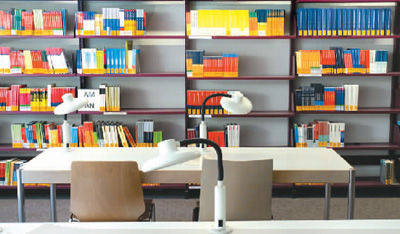This article is from: People’s Daily Overseas Edition

I opened the cabinet and put away my bags. I carried the baskets that the library had prepared for visitors and walked up the stairs, and the day in the library started like this . Usually, I choose to sit by the window, get tired of reading, and enjoy the view from the window.
Looking around the hall, some students are in a hurry, looking for information; some are quiet and enjoying reading. Outside the library, one window away is a bustling street in the center of Munich, Germany. Pedestrians on the road bow their heads and chat freely, which is in sharp contrast to the quiet library.
The University of Munich, where I study, has 16 libraries scattered across the city’s campuses. The one mentioned above is the one I go to most often. It is moderate in scale and well-furnished, with no fancy decorations.
This library mainly stores books on humanities and social sciences such as history, sociology, political science, and psychology. I often read professional books here for my daily study, and if I have time, I will also read non-fiction literary works, classic novels, etc.
The subway station is right in front of the library that I often go to. The transportation is convenient, and it is not far from the city center. There are many supermarkets and bakeries next to the building where it is located, which is more lively. However, there are usually not many people in the library. Perhaps because the library is relatively small, it is inconspicuous in the bustling downtown. I have passed this building several times, but I have not found that there is a university library in it. This quiet atmosphere and unique temperament make me prefer it among many libraries. Separated by a window, on one side is the library, a place to obtain nutrients and enrich oneself; on the other side is the bustling city, a place full of life.
I like to read literary works. When reading, I can use a third perspective to look at other people’s lives and understand other people’s thoughts, and be inspired in the process of savoring stories. I still remember reading “Red and Black” by French writer Stendhal, and I was deeply attracted by the ups and downs of the story. This novel is a representative work of French critical realism literature. The author, Stendhal, endows the protagonist with a distinctive character, and has a unique way of describing the character’s inner monologue. Although the novel is very long, the rhythm is lively. I sighed at the tragic fate of the characters in the book, and also sighed at the author’s profound literary attainments, creating a precedent for “stream-of-consciousness novels” and “psychological novels”.
In my reading journey, I found that people also become rational and brave. For example, in the face of complex information, the accumulation of reading brings us rich knowledge and in-depth thinking, helping us to distinguish between facts and truth, rather than copying what others say. For example, when I read the book “The Structural Transformation of the Public Sphere” by the German philosopher Jurgen Habermas, I couldn’t help thinking about how the public and private spheres we are in should be defined. How to speak rationally. Reading taught me to think twice about how to interpret my views and organize my language before I express it, so as to be as impartial as possible.
This library has been with me for two years. It is like a small world for me, where I spent many quiet study hours, which will become a special memory in my study abroad life.
(The author is a Chinese student at the University of Munich, Germany)